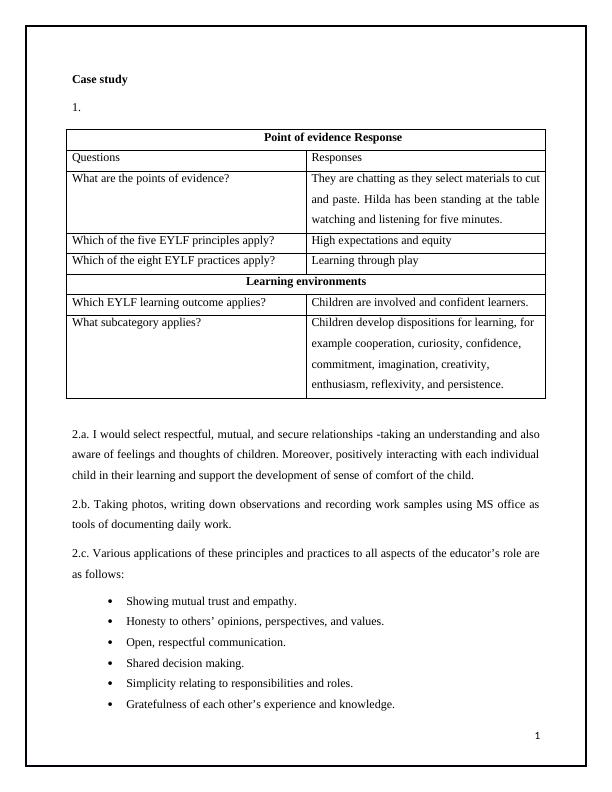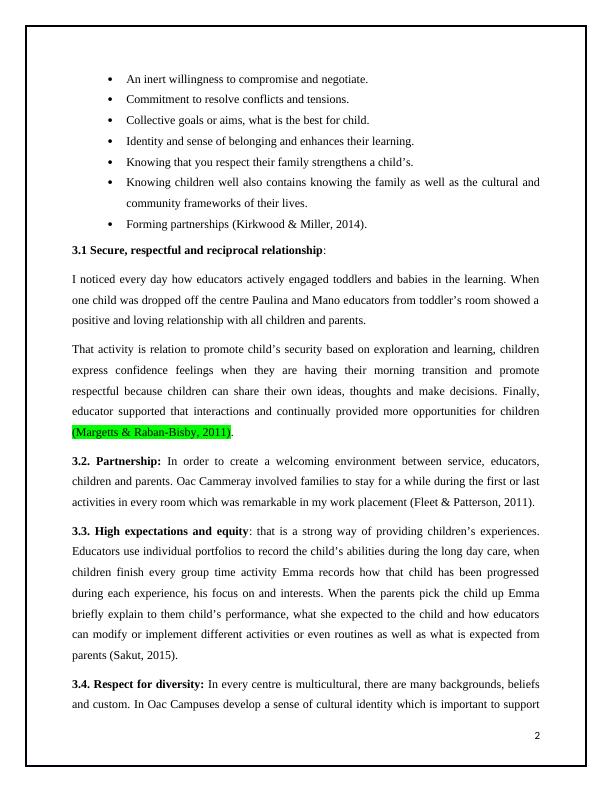Points of Evidence and EYLF Principles in Early Childhood Education
Added on 2023-04-17
4 Pages851 Words138 Views
Case study
1.
Point of evidence Response
Questions Responses
What are the points of evidence? They are chatting as they select materials to cut
and paste. Hilda has been standing at the table
watching and listening for five minutes.
Which of the five EYLF principles apply? High expectations and equity
Which of the eight EYLF practices apply? Learning through play
Learning environments
Which EYLF learning outcome applies? Children are involved and confident learners.
What subcategory applies? Children develop dispositions for learning, for
example cooperation, curiosity, confidence,
commitment, imagination, creativity,
enthusiasm, reflexivity, and persistence.
2.a. I would select respectful, mutual, and secure relationships -taking an understanding and also
aware of feelings and thoughts of children. Moreover, positively interacting with each individual
child in their learning and support the development of sense of comfort of the child.
2.b. Taking photos, writing down observations and recording work samples using MS office as
tools of documenting daily work.
2.c. Various applications of these principles and practices to all aspects of the educator’s role are
as follows:
Showing mutual trust and empathy.
Honesty to others’ opinions, perspectives, and values.
Open, respectful communication.
Shared decision making.
Simplicity relating to responsibilities and roles.
Gratefulness of each other’s experience and knowledge.
1
1.
Point of evidence Response
Questions Responses
What are the points of evidence? They are chatting as they select materials to cut
and paste. Hilda has been standing at the table
watching and listening for five minutes.
Which of the five EYLF principles apply? High expectations and equity
Which of the eight EYLF practices apply? Learning through play
Learning environments
Which EYLF learning outcome applies? Children are involved and confident learners.
What subcategory applies? Children develop dispositions for learning, for
example cooperation, curiosity, confidence,
commitment, imagination, creativity,
enthusiasm, reflexivity, and persistence.
2.a. I would select respectful, mutual, and secure relationships -taking an understanding and also
aware of feelings and thoughts of children. Moreover, positively interacting with each individual
child in their learning and support the development of sense of comfort of the child.
2.b. Taking photos, writing down observations and recording work samples using MS office as
tools of documenting daily work.
2.c. Various applications of these principles and practices to all aspects of the educator’s role are
as follows:
Showing mutual trust and empathy.
Honesty to others’ opinions, perspectives, and values.
Open, respectful communication.
Shared decision making.
Simplicity relating to responsibilities and roles.
Gratefulness of each other’s experience and knowledge.
1

An inert willingness to compromise and negotiate.
Commitment to resolve conflicts and tensions.
Collective goals or aims, what is the best for child.
Identity and sense of belonging and enhances their learning.
Knowing that you respect their family strengthens a child’s.
Knowing children well also contains knowing the family as well as the cultural and
community frameworks of their lives.
Forming partnerships (Kirkwood & Miller, 2014).
3.1 Secure, respectful and reciprocal relationship:
I noticed every day how educators actively engaged toddlers and babies in the learning. When
one child was dropped off the centre Paulina and Mano educators from toddler’s room showed a
positive and loving relationship with all children and parents.
That activity is relation to promote child’s security based on exploration and learning, children
express confidence feelings when they are having their morning transition and promote
respectful because children can share their own ideas, thoughts and make decisions. Finally,
educator supported that interactions and continually provided more opportunities for children
(Margetts & Raban-Bisby, 2011).
3.2. Partnership: In order to create a welcoming environment between service, educators,
children and parents. Oac Cammeray involved families to stay for a while during the first or last
activities in every room which was remarkable in my work placement (Fleet & Patterson, 2011).
3.3. High expectations and equity: that is a strong way of providing children’s experiences.
Educators use individual portfolios to record the child’s abilities during the long day care, when
children finish every group time activity Emma records how that child has been progressed
during each experience, his focus on and interests. When the parents pick the child up Emma
briefly explain to them child’s performance, what she expected to the child and how educators
can modify or implement different activities or even routines as well as what is expected from
parents (Sakut, 2015).
3.4. Respect for diversity: In every centre is multicultural, there are many backgrounds, beliefs
and custom. In Oac Campuses develop a sense of cultural identity which is important to support
2
Commitment to resolve conflicts and tensions.
Collective goals or aims, what is the best for child.
Identity and sense of belonging and enhances their learning.
Knowing that you respect their family strengthens a child’s.
Knowing children well also contains knowing the family as well as the cultural and
community frameworks of their lives.
Forming partnerships (Kirkwood & Miller, 2014).
3.1 Secure, respectful and reciprocal relationship:
I noticed every day how educators actively engaged toddlers and babies in the learning. When
one child was dropped off the centre Paulina and Mano educators from toddler’s room showed a
positive and loving relationship with all children and parents.
That activity is relation to promote child’s security based on exploration and learning, children
express confidence feelings when they are having their morning transition and promote
respectful because children can share their own ideas, thoughts and make decisions. Finally,
educator supported that interactions and continually provided more opportunities for children
(Margetts & Raban-Bisby, 2011).
3.2. Partnership: In order to create a welcoming environment between service, educators,
children and parents. Oac Cammeray involved families to stay for a while during the first or last
activities in every room which was remarkable in my work placement (Fleet & Patterson, 2011).
3.3. High expectations and equity: that is a strong way of providing children’s experiences.
Educators use individual portfolios to record the child’s abilities during the long day care, when
children finish every group time activity Emma records how that child has been progressed
during each experience, his focus on and interests. When the parents pick the child up Emma
briefly explain to them child’s performance, what she expected to the child and how educators
can modify or implement different activities or even routines as well as what is expected from
parents (Sakut, 2015).
3.4. Respect for diversity: In every centre is multicultural, there are many backgrounds, beliefs
and custom. In Oac Campuses develop a sense of cultural identity which is important to support
2

End of preview
Want to access all the pages? Upload your documents or become a member.
Related Documents
Diploma of Early Childhood Education and Care | Assessmentlg...
|16
|2958
|18
Teaching Philosophy Based on EYLFlg...
|5
|1069
|345
Early Years Learning Frameworklg...
|4
|909
|14
Building partnerships between services and familieslg...
|8
|2186
|37
Weekly Program for Children Age 3-5lg...
|7
|2333
|48
Diploma In Children's Services - Early Years Learning Framework for Australialg...
|9
|2286
|12
